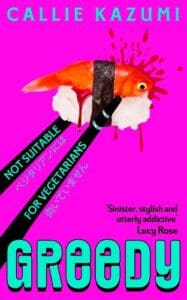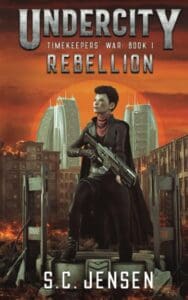
Synopsis:
After a heart-wrenching breakup with her girlfriend and a shocking incident at her job, Cassie flees her life as an overworked assistant in New York for her hometown in New Jersey, along the Delaware. There, she reconnects with her high school best friend, Eli, now a widowed father of two. Their bond reignites, and within a few short months, Cassie is married to Eli, living in his house in the woods, homeschooling the kids, and getting to know her reserved neighbor, Joan.
But Cassie’s fresh start is less idyllic than she’d hoped. She grapples with harm OCD, her mind haunted by gory, graphic images. And she’s afraid that she’ll never measure up to Eli’s late spouse, who was a committed homemaker and traditional wife. No matter what Cassie does, Beth’s shadow still permeates every corner of their home.
Soon, Cassie starts hearing a voice narrating the house’s secrets. As she listens, the voice grows stronger, guiding Cassie down a path to uncover the truth about Beth’s untimely death.
Review:
“House of Beth,” by Kerry Cullen is a strange and magnetic piece of literary horror- truly unlike anything that I have ever stumbled across before. With nods to Du Maurier, Cullen’s really quite irresistible debut is complex, intimate and melancholic, and weird too- full of prose lush enough to drape over your furniture but also some really quite jarring imagery. At its core “House of Beth,” is a novel about combatting the belief that you are an incompetent and irredeemable person, a poorly-functioning adult and your own worst enemy- it’s a book about the importance of living authentically and self-acceptance- it’s also the most uncanny and romantic and completely unique ghost story that I have read recently, maybe even in years. It’s rich, creepy and complex both thematically and in terms of its characters- it’s peculiar and charming, an overall corker of a novel from any author, but an outrageously brilliant debut.
We follow Cassiopeia, Cassie for short, Cass for shorter, who works in publishing as an editorial workhorse and lives in New York with her girlfriend Lavender. Or lived – past tense, italics implied. Her relationship fizzles, then her boss dies, and now Cassie is headed back to her charming small town in New Jersey. She’s staying in her parents house, which they are trying desperately to get rid of, and is at a bar one night when she runs into her estranged childhood best friend, Eli. He promptly vomits in her bag. It’s the stuff of rom-coms. They date, rather briefly, and it’s not long until Cassie has a husband and two kids and indeed a house. But- and you must picture me typing this looking up through a Princess Diana fringe- there were three of them in that marriage, with the presence of Eli’s recently deceased wife Beth being one that Cassie has stepped into entirely… with the presence of Beth being not yet a memory… with the presence of Beth being one that lingers.
Our main character, which is, I would argue, Cassie as opposed to Beth, is truly a fascinating and compelling one. She suffers from harm OCD, and the thoughts that she finds popping into her head are the source of the bulk of the horror imagery that takes place in this novel. Of course, those horrors are fleeting, the core one being the belief that your brain has turned traitor and you are in turn, a danger (should you not be familiar, these grim thoughts are not chosen or pleasurable ones, and should not be looked at with disgust but sympathy). On top of that, Cullen takes the stereotypes of the wicked stepmother and the greedy bisexual, and has Cassie internalise them with gusto, which alongside her OCD, well, makes for quite a protagonist. With her lies, perhaps the very marrow of the novel: the importance of acknowledging yourself as a singular, unrepeatable and worthy human being, getting the help that your owed when you need to, and above all, being true to yourself. This is a message central to Cassie’s bisexuality and broader identity, as well as one that goes hand in hand with small town living and evangelism in the wider novel.
I before told you that Cullen nods to Du Maurier, and that wasn’t a lie. “Rebecca,” and “House of Beth,” are both novels I would call gothic, and both address the theme of inheritance, and the toll that might take upon a protagonist. Beyond that though, tonally, texturally, “House of Beth,” is anything but derivative. Du Maurier’s “Rebecca,” is a novel of storms and cliffs and looming estates, and these big, overtly gothic landscapes are an integral part of it. Cullen’s novel is an internal one, the plot is spare, minimalist really (the bulk of it merely domestic life) the substance to be found instead in the atmosphere, the commentary, the characters and the gorgeous writing. It’s a novel in which just a couple of notable things happen, and yet (as we’ve just scratched the surface of) so much is said. Readers looking for a “Rebecca,” retelling will be surprised and disarmed but probably not disappointed by the quiet yet audacious little number that is “House of Beth.”
Haunting and hopeful, “House of Beth,” is a novel of glimpsed atrocities and domestic drama, beautifully written up into the weirdest little ghost story you ever did read. And though I wrestle with phrasing it in a way that isn’t so cliché, it bears saying: Cullen’s debut ultimately reminds us that we are most haunted by ourselves. An unpredictable interrogation of self-perception, self-appreciation, feminine desire, and the concept of the “Trad-wife,” (rather glaring aspects of the novel that I’ve failed to even touch upon- I told you there was a lot) this is an impactful read that could certainly be squeezed into the tail end of 2025.









Leave a Reply